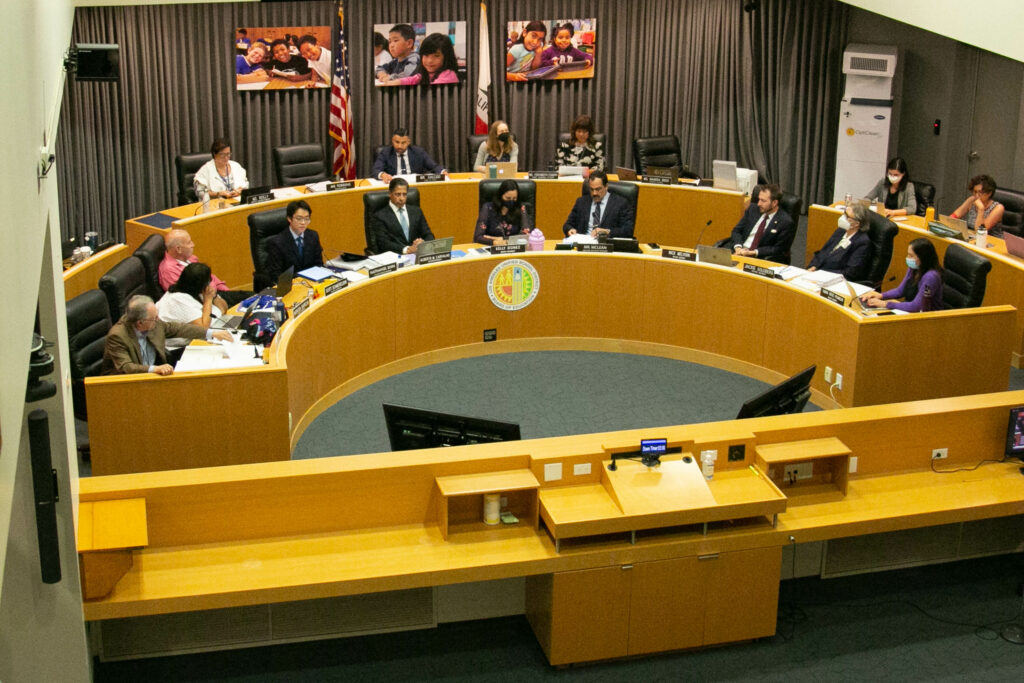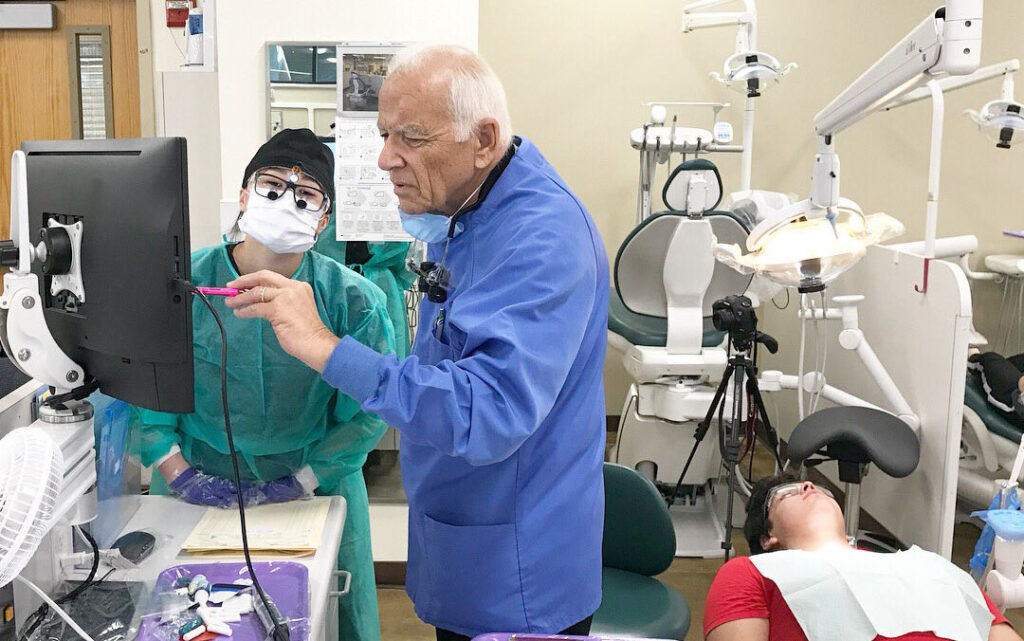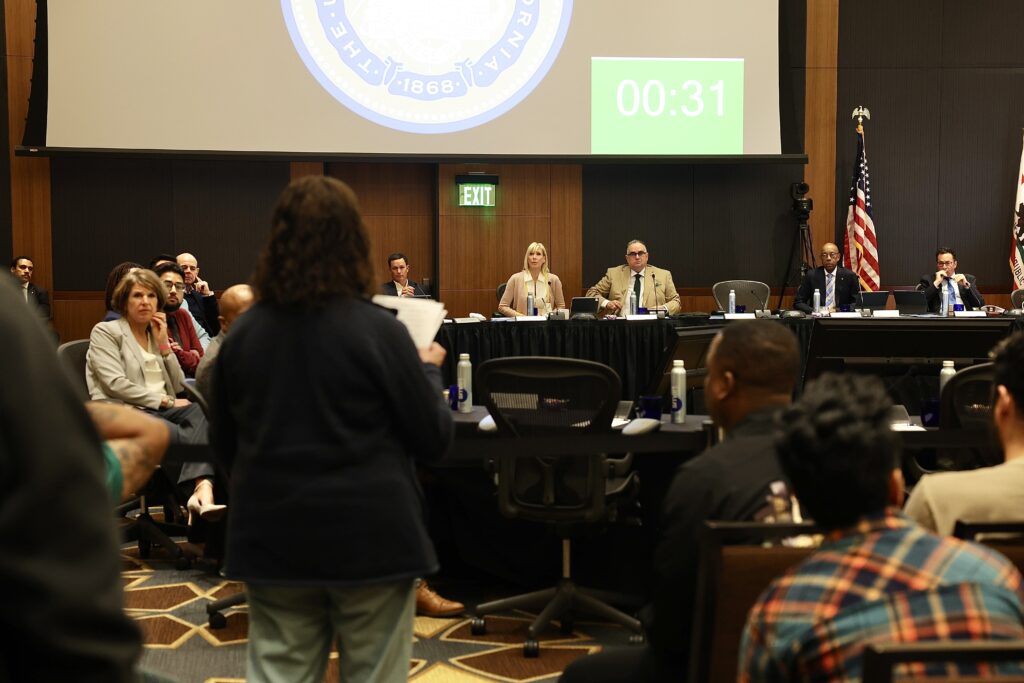
The LAUSD School Board meeting on Aug. 30, 2022 in Los Angeles. Credit: Julie Leopo, EdSource
The Los Angeles Unified School District school board voted 4-3 Tuesday to adopt a policy that would prevent charter schools from sharing a campus with the district’s Black Student Achievement Plan (BSAP) schools, community schools and priority schools.
This decision means that when making co-location offers, the board will try to avoid offers that “compromise district schools’ capacity to serve neighborhood children” and that “result in grade span arrangements that negatively impact student safety and build charter school pipelines that actively deter students from attending district schools.”
The policy is months in the making — beginning with a resolution passed in September, mandating that Superintendent Alberto Carvalho devise such a policy. Board members reviewed a draft of his proposal at January’s Committee of the Whole Meeting.
“This policy, in the eyes of some, does not go far enough; and, in the eyes of others, it goes too far,” Carvalho said at Tuesday’s meeting. “And somehow, experience tells me that any time you’re in that position, you probably achieved some degree of balance.”
Supporters of the co-location policy, including United Teachers Los Angeles, have claimed that the presence of charters in district schools has created an atmosphere of ongoing hostility and that charter schools take critical resources — including spaces used for enrichment programs and social-emotional support services — away from district students who are more vulnerable.
“Before we became a community school and a BSAP school, we had no arts, no sports, no clubs, and our students [compared] our school to a prison,” said a science teacher who spoke during public comments at Tuesday’s board meeting.
“The school has transformed….The students that used to want to leave immediately now want to stay after club hours. And this is only possible because we have the space available to host these resources.”
Pro-charter organizations maintain that the new policy is detrimental to the future of charter schools in Los Angeles and that it will likely result in more charters being divided across multiple LAUSD sites. They also anticipate charter closures will become more common.
“The district has finally made its intentions clear: to run charter schools out of town,” states a letter to Carvalho and LAUSD’s school board members by the L.A. Coalition for Excellent Public Schools — consisting of about half of charters in the district — including 107 charter schools that educate more than 50,000 students.
“If the district can just elbow charter schools out of the campuses they’ve been sharing – if it can engineer feeder patterns, if it can remove charters from predominantly Black campuses, if it can make it all but impossible for kids to enroll in charters throughout their K-12 education – then L.A. Unified will keep more students and save a few bucks.”
The letter further alleges that the district’s policy is not about students’ education or equity, but rather about the district’s enrollment and financial challenges.
“The resolution will most immediately and severely impact thousands of predominantly Black and Latino students. Even more alarming is that it paves the way for L.A. Unified to eradicate charter schools altogether, denying so many families their civil rights, their hopes and dreams for their children’s futures.”
Myrna Castrejón, president and CEO of the California Charter Schools Association, said in a statement that “the decision of the LAUSD Board of Education to enact this policy is divisive, discriminatory, and unlawful.”
Castrejón added, ”It is a shameful day when the second-largest school district in the nation puts politics ahead of students and families. . .. Instead of following California law and providing equitable facilities for charter public school students, LAUSD’s Board voted today with their campaign donors and against the very students they took an oath to support.”
‘Merely moving and enlarging challenges’
In addition to a wealth of support, the policy has also garnered backlash — from both pro-charter organizations and from individuals who said the policy doesn’t do enough to protect vulnerable students.
“This resolution is the capstone of a relentless, decades-long campaign….to cast blame rather than take responsibility,” the letter reads.
A survey conducted by CCSA’s Local Advocacy Team of 28 organizations also found that 10% of charter students in district facilities are Black/African American, in comparison to 4% of all public school students in LAUSD. About 90% of those students are from low income backgrounds.
Charters were also found to have more socio-economically disadvantaged students and students who are English learners.
Meanwhile, the coalition’s letter also states that blocking co-locations on BSAP campuses will lead to fewer charters being able to serve Black students in the long run, adding that it takes “gall to rob Black families of the critical lifeline that our schools provide.”
School Board Member Nick Melvoin, who voted against the policy, also said that while he appreciates the policy’s intentions, “the district’s own analysis suggests that this policy will create not fewer, but more co-locations.”
“This may placate some folks in the room, but next year, we’ll have folks from 600 other schools back here with concerns because we’re not solving anything,” Melvoin said. “We’re merely moving and enlarging challenges.”
Spreading a charter school across multiple campuses can have negative effects, according to charter proponents — and CCSA’s survey specifically found that:
- “89% (8/9) reported a negative impact on staffing due to a split campus.”
- “77% (7/9) reported a negative impact on school culture due to a split campus.”
- “66% (6/9) reported a negative impact on student enrollment and the ability of families to maintain access to the school due to a split campus.”
- “66% (6/9) reported a negative impact on school finances due to a split campus.”
- “55% (5/9) reported a negative impact on programs or academic offerings available to students due to a split campus.”
Meanwhile, LAUSD board president Jackie Goldberg, who co-authored the initial resolution passed in September, rebuked claims from charter proponents, insisting that she was not “complaining about charters” and had no intention to “un-do anything.”
“This resolution simply says if we can undo some of the problems we’ve created, let’s try to do that as we go forward,” Goldberg said.
Rather, she faulted Proposition 39 — which requires public school districts to share space with charters — calling it “flawed from the day it was written.” She also criticized the “privately owned, publicly funded” nature of charter schools.
Goldberg also blamed the CCSA and the current state of the charter movement — which she said is more focused on competing with public schools rather than improving them.
“Prop 39 overrules everything,” Goldberg claimed on Tuesday. “And the enormous amount of money that the California Charter Schools Association is willing to spend suing districts … .is a design for them to contain power in Sacramento.”
Meanwhile, Scott Schmerelson, vice president of the LAUSD school board, who voted in favor of the policy, said that while he sees the policy as a step forward, he also recognizes that some do not feel it is enough to protect the district’s most vulnerable students.
“I hear you, I want to say that I understand you don’t feel we’ve done enough,” he said. “But we have made progress. And for now, I am willing to say OK, we will approve this, but we will keep the conversation going.”
‘A substantial risk of litigation’
A letter released by Latham and Watkins LLP on behalf of the California Charter Schools Association, claims that the newly adopted policy is illegal and places the district at “a substantial risk of litigation.”
“By prioritizing public school students attending District-run schools over public school students who attend charter public schools, the policy violates Proposition 39’s mandate that ‘public school facilities should be shared fairly among all public school pupils, including those in charter schools,’” the letter reads.
According to the letter, there are currently 13 co-locations on the district’s priority schools this academic year — as well as seven on community schools and 19 on BSAP campuses.
“I just hope that as we walk out of this building today,” Carvalho said, “we recognize that at the end of the day, that the only thing that matters, the only thing that should matter…. is what we do for kids, how we do it for kids despite our positions as adults.”








